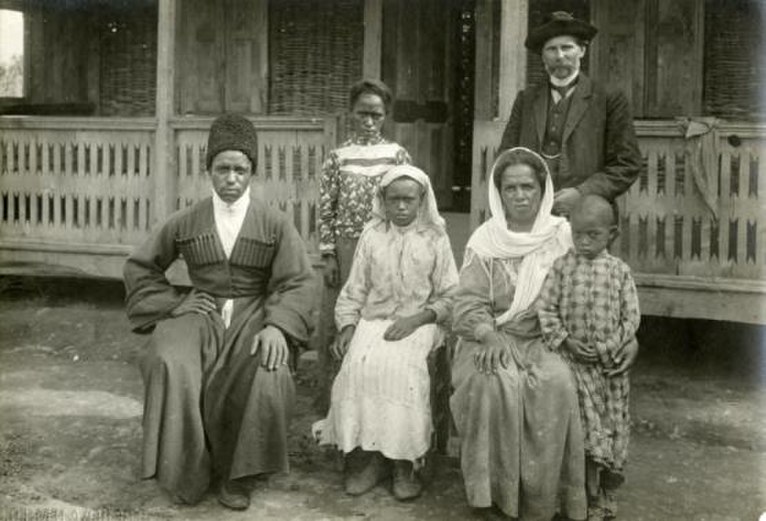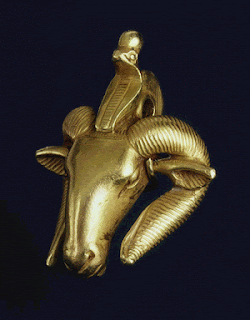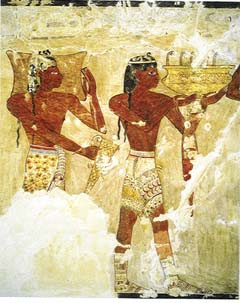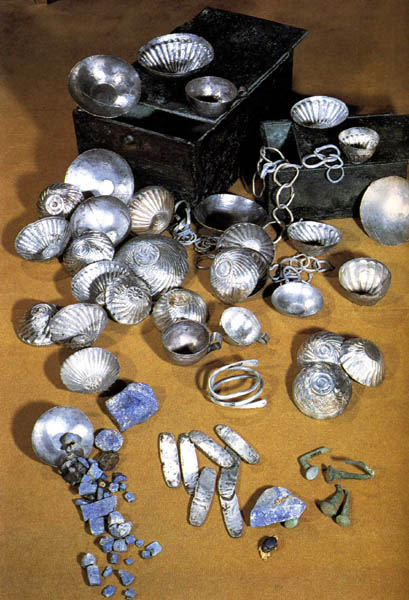Post by anansi on Jun 3, 2010 0:30:42 GMT -5
We all know of the quote from Herodotus about the military colony left behind But what's amazing is the presence of Blacks in the area apparently of African decent to the present day..really some one should take a more modern study on the apparently African descended folks still living there including genetic studies oral and written histories.
,..a view by P.T English
www.jstor.org/pss/543940
For the people of Colchis are evidently Egyptian, and this I perceived for myself before I heard it from others. So when I had come to consider the matter I asked them both; and the Colchians had remembrance of the Egyptians more than the Egyptians of the Colchians; but the Egyptians said they believed that the Colchians were a portion of the army of Sesostris. That this was so I conjectured myself not only because they are dark-skinned and have curly hair (this of itself amounts to nothing, for there are other races which are so), but also still more because the Colchians, Egyptians, and Ethiopians alone of all the races of men have practised circumcision from the first. The Phenicians and the Syrians who dwell in Palestine confess themselves that they have learnt it from the Egyptians, and the Syrians about the river Thermodon and the river Parthenios, and the Macronians, who are their neighbours, say that they have learnt it lately from the Colchians. These are the only races of men who practise circumcision, and these evidently practise it in the same manner as the Egyptians. Of the Egyptians themselves however and the Ethiopians, I am not able to say which learnt from the other, for undoubtedly it is a most ancient custom; but that the other nations learnt it by intercourse with the Egyptians, this among others is to me a strong proof, namely that those of the Phenicians who have intercourse with Hellas cease to follow the example of the Egyptians in this matter, and do not circumcise their children."
(Herodotus, The Histories, Book 2: 104)
wysinger.homestead.com/strabo.html
Some modern historians regard Herodotus as unreliable, and even Herodotus cautioned the reader that his story is hearsay. But Herodotus' account is not the only claim of an African presence in Eastern Europe. In the late 4th century, Church Fathers St Jerome and Sophronius, wrote of Colchis as the "second Ethiopia" because of its black population.10
Saint Jerome, writing during the fourth century, called Colchis the "Second Ethiopia." Two hundred years later, Sophronius, patriarch of Jerusalem, described an "Ethiopian" presence in the same region. Even today, in the same district about which Herodotus wrote, exists a minute, black-skinned and woolly-haired community, although the argument is waged that the Africans currently occupying the region are there solely as the result of enslavement. Obviously, like many aspects of the Global African Community, there is much more research that needs to be done.
www.cwo.com/~lucumi/georgia.html
The Nart Epic of Abkhazia (on Georgia's northwestern coast) is folklore believed to be thousands of years old. It tells of 100 black-skinned horsemen who visited the Caucasus and liked it so much some of them stayed.11 Dmitri Gulia (1874-1960), a Abkhazian linguist, ethnographer and historian, amassed a large collection of words and names that were similar in the Egyptian, Ethiopian and Abkhazian languages. The names included family names, names of pre-Christian deities, names of rivers and mountains. He also noted customs and folk beliefs Abkhazia seemed to share with Egypt and Ethiopia.


Right up till the time of the Middle ages there have been reports of Blacks in that area of the Black-Sea

Kirke, Daughter of the Sun
Kirke (Circe) is the daughter of Helios (the Sun) and the Okeanid, Perseis, which would make her the grand-daughter of Okeanos (Ocean). Kirke was also the sister of king Aietes (Aeetes) of Kolchis (Colchis).
On her island ... in her palace ... Kirke waits for lost sailors to come wandering to her door as supplicants. Normally, a traveler is treated as a special guest but with Kirke, travelers are drugged and turned into animals to serve her as she sees fit.
I have a tape of Paul Robinson talking about his trip through the then newly formed U.S.S.R and he said he was struck by the number of African decedent people he had seen in the area of Abakhazia.
,..a view by P.T English
www.jstor.org/pss/543940
For the people of Colchis are evidently Egyptian, and this I perceived for myself before I heard it from others. So when I had come to consider the matter I asked them both; and the Colchians had remembrance of the Egyptians more than the Egyptians of the Colchians; but the Egyptians said they believed that the Colchians were a portion of the army of Sesostris. That this was so I conjectured myself not only because they are dark-skinned and have curly hair (this of itself amounts to nothing, for there are other races which are so), but also still more because the Colchians, Egyptians, and Ethiopians alone of all the races of men have practised circumcision from the first. The Phenicians and the Syrians who dwell in Palestine confess themselves that they have learnt it from the Egyptians, and the Syrians about the river Thermodon and the river Parthenios, and the Macronians, who are their neighbours, say that they have learnt it lately from the Colchians. These are the only races of men who practise circumcision, and these evidently practise it in the same manner as the Egyptians. Of the Egyptians themselves however and the Ethiopians, I am not able to say which learnt from the other, for undoubtedly it is a most ancient custom; but that the other nations learnt it by intercourse with the Egyptians, this among others is to me a strong proof, namely that those of the Phenicians who have intercourse with Hellas cease to follow the example of the Egyptians in this matter, and do not circumcise their children."
(Herodotus, The Histories, Book 2: 104)
wysinger.homestead.com/strabo.html
Some modern historians regard Herodotus as unreliable, and even Herodotus cautioned the reader that his story is hearsay. But Herodotus' account is not the only claim of an African presence in Eastern Europe. In the late 4th century, Church Fathers St Jerome and Sophronius, wrote of Colchis as the "second Ethiopia" because of its black population.10
Saint Jerome, writing during the fourth century, called Colchis the "Second Ethiopia." Two hundred years later, Sophronius, patriarch of Jerusalem, described an "Ethiopian" presence in the same region. Even today, in the same district about which Herodotus wrote, exists a minute, black-skinned and woolly-haired community, although the argument is waged that the Africans currently occupying the region are there solely as the result of enslavement. Obviously, like many aspects of the Global African Community, there is much more research that needs to be done.
www.cwo.com/~lucumi/georgia.html
The Nart Epic of Abkhazia (on Georgia's northwestern coast) is folklore believed to be thousands of years old. It tells of 100 black-skinned horsemen who visited the Caucasus and liked it so much some of them stayed.11 Dmitri Gulia (1874-1960), a Abkhazian linguist, ethnographer and historian, amassed a large collection of words and names that were similar in the Egyptian, Ethiopian and Abkhazian languages. The names included family names, names of pre-Christian deities, names of rivers and mountains. He also noted customs and folk beliefs Abkhazia seemed to share with Egypt and Ethiopia.


Right up till the time of the Middle ages there have been reports of Blacks in that area of the Black-Sea

Kirke, Daughter of the Sun
Kirke (Circe) is the daughter of Helios (the Sun) and the Okeanid, Perseis, which would make her the grand-daughter of Okeanos (Ocean). Kirke was also the sister of king Aietes (Aeetes) of Kolchis (Colchis).
On her island ... in her palace ... Kirke waits for lost sailors to come wandering to her door as supplicants. Normally, a traveler is treated as a special guest but with Kirke, travelers are drugged and turned into animals to serve her as she sees fit.
I have a tape of Paul Robinson talking about his trip through the then newly formed U.S.S.R and he said he was struck by the number of African decedent people he had seen in the area of Abakhazia.








